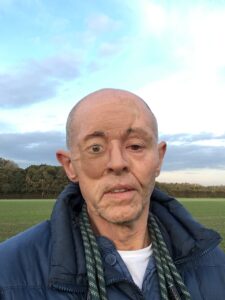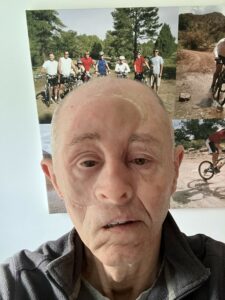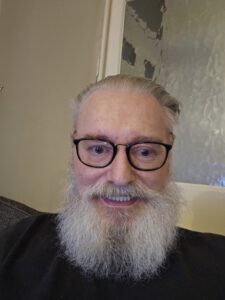An inside look into one of Manchester’s most fascinating hospital departments, who perform highly delicate surgery to change the lives of patients with facial prosthetics
In 2011, tragedy struck when Graeme Heward, a 62-year-old physiotherapist from Lymm, was diagnosed with nasal and sinus cancer – which is extremely rare.
He said: “My only symptom was a watery eye. Eventually, I went for a scan at Wythenshawe Hospital, which showed that I had a tumour as big as an egg, putting pressure on my nose and fracturing my eye.
“I was totally shocked. As a physiotherapist, I have always eaten well, exercised regularly. I was just very unlucky. My cancer was one in 100 000, which if you put it into perspective, is just one person in the entire of Wembley stadium. That would just look like a spec, and I was the spec”.
Due to the delicate location of his tumour, it was very difficult for medics to monitor and as a result, Graeme has undergone around 50 surgeries, as well as two rounds of both chemotherapy and radiotherapy. He now has a fully prosthetic right eye and nose and a partially prosthetic forehead.
The Oral and Maxillofacial Department, based at North Manchester General Hospital, not only design prosthetics, but perform surgery which involves using magnets to make sure that these are fixed properly.
The process involves a computed tomography (CT) scan, followed by a 3D printer to print the mould for the prosthetic, which helps to make the very delicate surgery as minimally invasive as possible. Implants are then surgically inserted into the patient’s skull and are left to settle there for four months before the magnets are attached.
He said: “Skulls aren’t thick, so the medics need to do it very accurately. Radiotherapy can soften bone, so there was concern that the magnets wouldn’t take after the surgery. Luckily it was successful, and I now have seven magnets in my skull, meaning my prosthetics are more secure and balanced – I can even wear glasses.
“Iwona from the prosthetics team combines her incredible artistic and creative skills with technology to create the most fantastic resemblance of what I used to look like. The department have absolutely transformed my life and they’re worth their weight in gold”.
Graeme has never allowed his cancer to stop him. He has participated in a charity cycle across the country for Maggie’s Centre, and regularly plays sports and walks his two dogs.
He said: “I’m a very active person but having both chemotherapy and radiotherapy was physically affecting me. I had to change my lifestyle to work around it and began working less hours. But it never completely stopped me; I changed my sport of choice from tennis to raquetball.
“I have two sons, who were aged 19 and 17 at the time of my diagnosis and attended a lot of my appointments. Now one is an anaesthetist, and one is an Ear, Nose and Throat surgeon.”
Graeme, who continues to be treated for cancer at Manchester Royal Infirmary, added:
“I refer to my cancer as ‘the alien’. I didn’t want to make friends with it and I felt invaded. It’s it or me. Eventually I decided that we could live together if it didn’t kill me. Although I have not yet been given the ‘all clear’, I’m in the best position now than I ever have been”.


Hany Nasry is the Clinical Director of Oral and Maxillofacial Department based at North Manchester General Hospital. Typically, a patient who is seen by him and his highly skilled team will have their prosthetic planned for them, then will undergo surgery according to the 3D planning, so eventually the prosthesis can be fixed more securely.
Hany said: “Our team treat a very wide range of patients from those with benign dental issues which need restoration, to those who have suffered traumatic injuries.
“We also work closely with head and neck oncology, as tumours and radiotherapy can cause blindness and a paralysis of nerves.
“Considering all the patients’ individual circumstances, we have to look at the different ways that we can fix prosthetics to give them a better quality of life”.
Barry, aged 59, is a Mental Health Nursing Assistant from Failsworth and has been on a 10-year journey to regain his smile. He said: “Up until my late forties I’d never had any health problems related to my teeth.
“I went to the dentist regularly and they never offered me a scale and polish as part of the service, so I just went under the assumption that it didn’t need doing”.
In 2014, Barry had his wisdom teeth removed, which had devastating side effects.
He said: “I never understood the point of wisdom teeth, but I think sometimes they keep them all in line and so my other ones had started to spread.
“As this was happening, I’d been getting debris into the tooth socket which caused inflammation and infection making my gums recede.
“Eventually I had six teeth removed and I was left with two stubs of teeth on the bottom row. I looked like something from Lord of the Rings”.
Sadly, dentures were not suitable for him and as a result, Barry was on a diet of soft food and liquid for nearly 10 years. He said: “The dentures were fitted properly but the bond would soften if it got too warm. If I tried to bite into anything, the wooden clip from the back would click out.
“Normally, when people have teeth removed, their gums naturally harden, and they can at least chew. Mine didn’t, so it left me severely anaemic, and I had absolutely no energy”.
Barry was referred to North Manchester General Hospital, where the maxillofacial department began the process for fitting his new teeth. Like Graeme’s procedure, the main operation consisted of drilling into Barry’s skull and lower jaw to fix the implants and wait for the osseointegration – the direct connection between living bone and the surface of an artificial implant.
Once the implants are stable, they are uncovered, and a bar is attached to the implants. The teeth clip on the bar held by the implants which means that dentures are firmly positioned and can be easily removed.

Due to his ill health, the department expressed concern on whether this would be successful. Luckily, this healed within a couple of months and Barry was able to begin his recovery. He said: “The first solid food I was able to eat was an apple. It was very emotional, both me and my wife were crying.
“Food is so important and the whole ordeal affected my social life. I missed everything from birthdays, Halloween parties and Christmases. I even grew a long beard and moustache so you couldn’t see my mouth.
“Now I’m back eating and I’m seeing people that I haven’t seen for years. I’ve even shaved off my facial hair and I have my smile back!”.